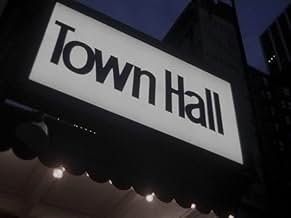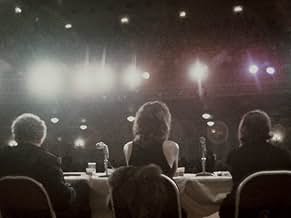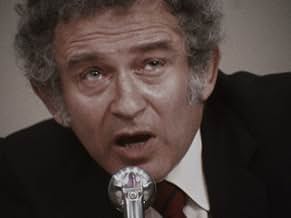Aggiungi una trama nella tua linguaInfamously macho author Norman Mailer shares a 1971 NYC panel with an audience of intellectual women and famous feminists receiving a lively critique revealing the sophisticated political, l... Leggi tuttoInfamously macho author Norman Mailer shares a 1971 NYC panel with an audience of intellectual women and famous feminists receiving a lively critique revealing the sophisticated political, literary discourse of early Women's Lib movement.Infamously macho author Norman Mailer shares a 1971 NYC panel with an audience of intellectual women and famous feminists receiving a lively critique revealing the sophisticated political, literary discourse of early Women's Lib movement.
- Regia
- Sceneggiatura
- Star
Anatole Broyard
- Self
- (non citato nei titoli originali)
Gregory Corso
- Self
- (non citato nei titoli originali)
Betty Friedan
- Self (author)
- (non citato nei titoli originali)
Elizabeth Hardwick
- Self (critic)
- (non citato nei titoli originali)
John Hollander
- Self
- (non citato nei titoli originali)
Cynthia Ozick
- Self
- (non citato nei titoli originali)
Susan Sontag
- Self
- (non citato nei titoli originali)
Recensioni in evidenza
Town Bloody Hall documents a 1971 debate between Norman Mailer, acting as moderator, and four feminist writers, including Germaine Greer and Diana Trilling. The standing room audience of literati attending the event, Susan Sontag and Betty Friedan among them, joined in the fracas toward the end. The starting point of the discussion was The Prisoner Of Sex, Mailer's recently published rejoinder to Greer's The Female Eunuch and other writings of the emerging women's liberation movement. Mailer tries to make the case, rather vainly (in both senses of the word), for some consideration of the man's position in feminist rhetoric, and tries to draw the connection between biological function and social/psychological destiny, an old trick used by everyone from Freud to Ayn Rand. At one point, discussing how the disparity in physical strength between men and women causes them to respond differently to conflict, Mailer posits that when a man and a woman argue, sooner or later the man's temper is going to lead to a decision about whether or not to hit her. And if he does, says Mailer, he has immediately lost the argument. But if he doesn't hit her, and the woman keeps endlessly attacking him, taking advantage of his restraint and using it against him, then she is just as surely going to kill him by degrees.
Germaine Greer's comments focused mostly on how societally dictated attitudes toward women and the traditional roles assigned to them serve to repress women and keep them from achieving their full potential, especially artistically, as the male artistic ego and consumerism hold them back. The most reasoned rhetoric of the evening comes from critic Diana Trilling who, while lauding the goals and intent of the women's movement, reserves the right to ignore any dogma imposed upon her, sexually or otherwise, by any movement, feminist or chauvinist, that doesn't coincide with her beliefs and needs as an individual. Speaking about the political baggage being assigned to female orgasm at the time, Trilling says, dryly, "I could hope we would also be free to have such orgasms as, in our individual complexities, we happen to be capable of." Her remarks foreshadow the corrective reaction of many feminists in subsequent years to the absolutism of much 70s era women's lib rhetoric, typified by the opposition of pro-porn activists like Annie Sprinkle to anti-porn crusaders like Andrea Dworkin.
Mailer starts off the evening as a gracious enough host, but as his masculinity increasingly comes under fire throughout the evening, especially from Greer, the whole enterprise rapidly devolves into barbed rejoinders and verbal one-upsmanship, all of it generally good natured and hilariously funnyMailer at one point gets up and courteously pours glasses of water for the women on the panel. Watching the whole thing over thirty years later, I was struck not only by the datedness of much of the argument, but also by how lively and intellectually informed and spirited our cultural debate used to be, compared to the current lack of literary and liberal vibrancy in our corporate controlled public discourse. All of us, women and men, are subject to consumer driven sexual objectification these daysgotta look good in your Calvin Klein underwearand any sense that times are changing for the better and that we can somehow affect those changes through lively public discourse has totally gone out the window.
Perhaps the wisest take on the issues of the evening was by a writer who wasn't there, Joyce Carol Oates, who in a 1971 essay on The Prisoner Of Sex wrote, "But after all this, after all these considerations, we are still left with the rage of Women's Liberation. How to explain this anger? And we understand slowly that what is being liberated is really hatred. Hatred of men. Women have always been forbidden hatred. Certainly they have been forbidden the articulation of all base, aggressive desires, in a way that men have not. Aggression has been glorified in men, abhorred in women. Now, the hatred is emerging. And such hatred! Such crude, vicious jokes at the expense of men! Most women, reading the accusations of certain feminists, will be as shocked and demoralized as Norman Mailer himself. Somehow, in spite of all the exploitation, the oppression, somehow . . . there are things about the private lives of men and women that should not be uttered, or at least we think they should not be uttered, they are so awful. Women have been the subjects of crude jokes for centuries, the objects of healthy male scorn, and now, as the revolution is upon us, men will become the objects of this scorn, this exaggerated disgust and comic sadism. Nothing will stop the hatred, not the passage of legislation, not the friendliest of men eager to come out in support of Women's Liberation. It has just begun. It is going to get worse. And yet, it will probably be short-lived. Hatred goes nowhere, has no goal, no energy. It has a certain use, but it has no beauty. There will be a place in our society for Mailer's heroic mysticism, at the point in history at which women can afford the same mysticism."
Germaine Greer's comments focused mostly on how societally dictated attitudes toward women and the traditional roles assigned to them serve to repress women and keep them from achieving their full potential, especially artistically, as the male artistic ego and consumerism hold them back. The most reasoned rhetoric of the evening comes from critic Diana Trilling who, while lauding the goals and intent of the women's movement, reserves the right to ignore any dogma imposed upon her, sexually or otherwise, by any movement, feminist or chauvinist, that doesn't coincide with her beliefs and needs as an individual. Speaking about the political baggage being assigned to female orgasm at the time, Trilling says, dryly, "I could hope we would also be free to have such orgasms as, in our individual complexities, we happen to be capable of." Her remarks foreshadow the corrective reaction of many feminists in subsequent years to the absolutism of much 70s era women's lib rhetoric, typified by the opposition of pro-porn activists like Annie Sprinkle to anti-porn crusaders like Andrea Dworkin.
Mailer starts off the evening as a gracious enough host, but as his masculinity increasingly comes under fire throughout the evening, especially from Greer, the whole enterprise rapidly devolves into barbed rejoinders and verbal one-upsmanship, all of it generally good natured and hilariously funnyMailer at one point gets up and courteously pours glasses of water for the women on the panel. Watching the whole thing over thirty years later, I was struck not only by the datedness of much of the argument, but also by how lively and intellectually informed and spirited our cultural debate used to be, compared to the current lack of literary and liberal vibrancy in our corporate controlled public discourse. All of us, women and men, are subject to consumer driven sexual objectification these daysgotta look good in your Calvin Klein underwearand any sense that times are changing for the better and that we can somehow affect those changes through lively public discourse has totally gone out the window.
Perhaps the wisest take on the issues of the evening was by a writer who wasn't there, Joyce Carol Oates, who in a 1971 essay on The Prisoner Of Sex wrote, "But after all this, after all these considerations, we are still left with the rage of Women's Liberation. How to explain this anger? And we understand slowly that what is being liberated is really hatred. Hatred of men. Women have always been forbidden hatred. Certainly they have been forbidden the articulation of all base, aggressive desires, in a way that men have not. Aggression has been glorified in men, abhorred in women. Now, the hatred is emerging. And such hatred! Such crude, vicious jokes at the expense of men! Most women, reading the accusations of certain feminists, will be as shocked and demoralized as Norman Mailer himself. Somehow, in spite of all the exploitation, the oppression, somehow . . . there are things about the private lives of men and women that should not be uttered, or at least we think they should not be uttered, they are so awful. Women have been the subjects of crude jokes for centuries, the objects of healthy male scorn, and now, as the revolution is upon us, men will become the objects of this scorn, this exaggerated disgust and comic sadism. Nothing will stop the hatred, not the passage of legislation, not the friendliest of men eager to come out in support of Women's Liberation. It has just begun. It is going to get worse. And yet, it will probably be short-lived. Hatred goes nowhere, has no goal, no energy. It has a certain use, but it has no beauty. There will be a place in our society for Mailer's heroic mysticism, at the point in history at which women can afford the same mysticism."
I'm in my early twenties - so Norman Mailer, Susan Sontag and Germaine Greer were mostly famous names to me. After stumbling across this documentary on tv I got hooked though. Seeing highly intelligent people debating is almost always entertaining, and there are many fantastic moments in this documentary. The arguments and the characters are marked by their time (the debate takes place in 1971), but it paints an interesting picture of the different aspects of the gender debate in that period. Seeing the documentary today is an excellent way of getting a perspective on the feminist debate today and comparing.
Town Bloody Hall is a documentary that charts the course of a public debate about feminism and the feminist movement, chaired by none other than Norman Mailer. The film is quite humorous at times as the debate grows a little heated, but in the end I have to wonder why it was felt that this would constitute riveting viewing material. The various participants in the debate seem quite un-sure as to the validity of their respective arguements when cross-examined by the other speakers, Mailer in particular. Jill Johnson´s vontribution, a feminist-lesbian poem was the most interesting part of the movie, not only because it was highly entertaining, but also because it´s length of duration (over the allotted ten minutes) appeared to infuriate an up till then in control Mr Mailer. It was interesting to see him wringle on the end of his own hook. Germaine Greer made an interesting point about the immorality of some rich folks earning more in one week than a thousand working-class families could make, collectively, in a year. How this rightful indignation, however, reflected on a debate concerned with feminism and woman´s issues in a patriarchal world was a little beyond my comprehension!. The film displays all the hallmarks we have come to expect from D.A. Pennebaker - grainy shots, out of focus shots, hand-held camera shots, etc. How come all of his documentary films seem to appear somehow "out of date", as though the camera stock being used was slowly disintegrating?. This film was only made in 1979 yet it feels as though it belongs to some period in the sixties, between "Monterey Pop" and "Don´t look Back". An intersting look at an interesting debate, but ultimately I felt that a more satisfactory film could have been made to enhance and illuminate the issues that were discussed.
Lo sapevi?
- QuizFilmed by Pennebaker in 1971, but the rushes were consigned to the filmmaker's vaults as unusable after their initial viewing. After meeting and marrying Pennebaker in the mid-1970s, Chris Hegedus discovered the footage and edited together the final version of the film for release in 1979. The film went on to enjoy a five-year cinematic release in the United Kingdom.
- ConnessioniFeatured in The 50 Year Argument (2014)
I più visti
Accedi per valutare e creare un elenco di titoli salvati per ottenere consigli personalizzati
Dettagli
- Data di uscita
- Paese di origine
- Lingua
- Celebre anche come
- A Dialogue on Women's Liberation
- Luoghi delle riprese
- Azienda produttrice
- Vedi altri crediti dell’azienda su IMDbPro
Contribuisci a questa pagina
Suggerisci una modifica o aggiungi i contenuti mancanti























